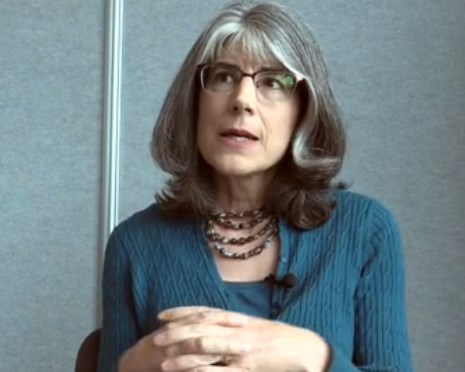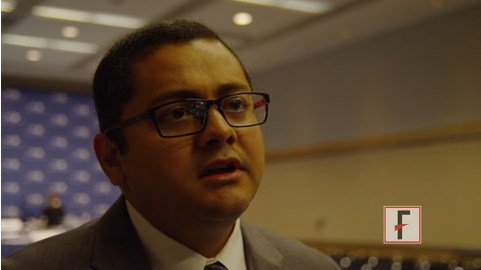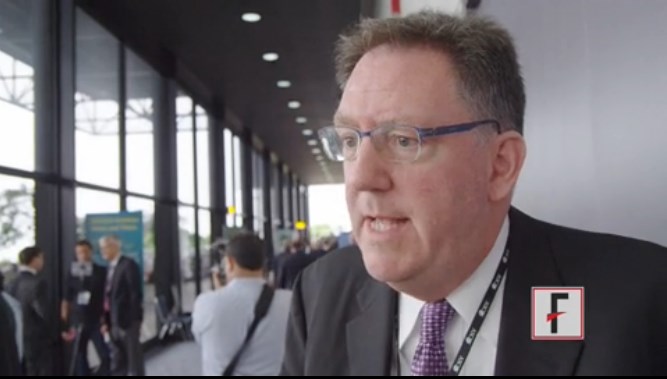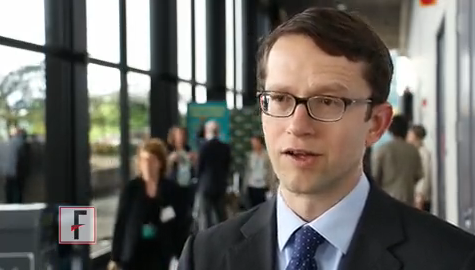User login
VIDEO: Getting first-episode psychosis treatment in the community setting ‘just right’
TORONTO – Because cardiometabolic syndrome is a primary concern in first-episode psychosis on the schizophrenia spectrum, one study explored whether prescriber education alone was enough to help ensure the correct antipsychotic medication was prescribed in the community setting.
“Prescribers are aware of the cardiometabolic effects of antipsychotics, but in the heat of the moment, it might not be in the forefront of their minds,” says study coauthor Dr. Mary F. Brunette, medical director of the Bureau of Behavioral Health at the Department of Health and Human Services in Concord, N.H., in this video interview. By measuring whether an educational intervention changed prescriber habits, Dr. Brunette, who presented the findings at the annual meeting of the American Psychiatric Association, and her colleagues determined that there were some improvements, particularly in polypharmacy. The study also showed that although gender, age, and insurance status did influence a prescriber’s choice of antipsychotics, actual diagnosis had limited and inconsistent effects.
The video associated with this article is no longer available on this site. Please view all of our videos on the MDedge YouTube channel
wmcknight@frontlinemedicalnews.com
On Twitter @whitneymcknight
TORONTO – Because cardiometabolic syndrome is a primary concern in first-episode psychosis on the schizophrenia spectrum, one study explored whether prescriber education alone was enough to help ensure the correct antipsychotic medication was prescribed in the community setting.
“Prescribers are aware of the cardiometabolic effects of antipsychotics, but in the heat of the moment, it might not be in the forefront of their minds,” says study coauthor Dr. Mary F. Brunette, medical director of the Bureau of Behavioral Health at the Department of Health and Human Services in Concord, N.H., in this video interview. By measuring whether an educational intervention changed prescriber habits, Dr. Brunette, who presented the findings at the annual meeting of the American Psychiatric Association, and her colleagues determined that there were some improvements, particularly in polypharmacy. The study also showed that although gender, age, and insurance status did influence a prescriber’s choice of antipsychotics, actual diagnosis had limited and inconsistent effects.
The video associated with this article is no longer available on this site. Please view all of our videos on the MDedge YouTube channel
wmcknight@frontlinemedicalnews.com
On Twitter @whitneymcknight
TORONTO – Because cardiometabolic syndrome is a primary concern in first-episode psychosis on the schizophrenia spectrum, one study explored whether prescriber education alone was enough to help ensure the correct antipsychotic medication was prescribed in the community setting.
“Prescribers are aware of the cardiometabolic effects of antipsychotics, but in the heat of the moment, it might not be in the forefront of their minds,” says study coauthor Dr. Mary F. Brunette, medical director of the Bureau of Behavioral Health at the Department of Health and Human Services in Concord, N.H., in this video interview. By measuring whether an educational intervention changed prescriber habits, Dr. Brunette, who presented the findings at the annual meeting of the American Psychiatric Association, and her colleagues determined that there were some improvements, particularly in polypharmacy. The study also showed that although gender, age, and insurance status did influence a prescriber’s choice of antipsychotics, actual diagnosis had limited and inconsistent effects.
The video associated with this article is no longer available on this site. Please view all of our videos on the MDedge YouTube channel
wmcknight@frontlinemedicalnews.com
On Twitter @whitneymcknight
AT THE APA ANNUAL MEETING
Update on Advanced Prostate Cancer
Recent clinical trials of hormonal and endocrine therapies combined with chemotherapy have shown promise for patients with prostate cancer, according to Tomasz Beer, MD, of the Oregon Health and Science University.
“The landscape for prostate cancer therapy has really been evolving quite dramatically,” Dr. Beer said. “In 2005 we had the first life-extending chemotherapy; by 2011 we had 4 agents; and now we have 6 agents that shown an overall survival advantage.”
Recent clinical trials of hormonal and endocrine therapies combined with chemotherapy have shown promise for patients with prostate cancer, according to Tomasz Beer, MD, of the Oregon Health and Science University.
“The landscape for prostate cancer therapy has really been evolving quite dramatically,” Dr. Beer said. “In 2005 we had the first life-extending chemotherapy; by 2011 we had 4 agents; and now we have 6 agents that shown an overall survival advantage.”
Recent clinical trials of hormonal and endocrine therapies combined with chemotherapy have shown promise for patients with prostate cancer, according to Tomasz Beer, MD, of the Oregon Health and Science University.
“The landscape for prostate cancer therapy has really been evolving quite dramatically,” Dr. Beer said. “In 2005 we had the first life-extending chemotherapy; by 2011 we had 4 agents; and now we have 6 agents that shown an overall survival advantage.”
VIDEO: Dr. Walter M. Stadler gives take-home messages from ASCO 2015 GU sessions
CHICAGO – Dr. Walter M. Stadler provides his take on ASCO 2015 presentations and discussions around genitourinary research, including practice-changing results on the use of chemotherapy for treating prostate cancer and the timing of androgen suppression. He also addresses the disappointing results for using precision medicine to treat bladder cancer versus the encouraging results from immunotherapy for both bladder and renal cell cancer. Dr. Stadler is the Fred C. Buffett Professor of Medicine and Surgery; associate dean for clinical research; chief, section of hematology/oncology; and director, genitourinary program, University of Chicago. He had no financial disclosures.
The video associated with this article is no longer available on this site. Please view all of our videos on the MDedge YouTube channel
lnikolaides@frontlinemedcom.com
On Twitter @nikolaideslaura
CHICAGO – Dr. Walter M. Stadler provides his take on ASCO 2015 presentations and discussions around genitourinary research, including practice-changing results on the use of chemotherapy for treating prostate cancer and the timing of androgen suppression. He also addresses the disappointing results for using precision medicine to treat bladder cancer versus the encouraging results from immunotherapy for both bladder and renal cell cancer. Dr. Stadler is the Fred C. Buffett Professor of Medicine and Surgery; associate dean for clinical research; chief, section of hematology/oncology; and director, genitourinary program, University of Chicago. He had no financial disclosures.
The video associated with this article is no longer available on this site. Please view all of our videos on the MDedge YouTube channel
lnikolaides@frontlinemedcom.com
On Twitter @nikolaideslaura
CHICAGO – Dr. Walter M. Stadler provides his take on ASCO 2015 presentations and discussions around genitourinary research, including practice-changing results on the use of chemotherapy for treating prostate cancer and the timing of androgen suppression. He also addresses the disappointing results for using precision medicine to treat bladder cancer versus the encouraging results from immunotherapy for both bladder and renal cell cancer. Dr. Stadler is the Fred C. Buffett Professor of Medicine and Surgery; associate dean for clinical research; chief, section of hematology/oncology; and director, genitourinary program, University of Chicago. He had no financial disclosures.
The video associated with this article is no longer available on this site. Please view all of our videos on the MDedge YouTube channel
lnikolaides@frontlinemedcom.com
On Twitter @nikolaideslaura
AT THE 2015 ASCO ANNUAL MEETING
VIDEO: Can women physicians have it all? Absolutely, says AMWA past president
CHICAGO – Can women physicians succeed professionally while also meeting their personal goals?
Absolutely, says Dr. Farzanna Haffizulla, immediate past president of the American Medical Women’s Association and founder of a concierge practice in Davie, Fla.
While women physicians face challenges during every stage of their training and career, they should never give up personal goals for professional ambitions, or vice versa, Dr. Haffizulla said at the annual meeting of the American Medical Women’s Association.
Women doctors can meet dual objectives through strong organization, dedicated support systems, and steady determination, said Dr. Haffizulla, a nationally recognized speaker on work/life balance who has authored two books on the subject and runs the work/life balance website www.BusyMomMD.com.
In this video, Dr. Haffizulla shares her personal story of raising a family while also meeting her professional aspirations. She offers guidance and wisdom for other women physicians about how they can achieve a healthy work/life balance and remain fulfilled in all arenas.
CHICAGO – Can women physicians succeed professionally while also meeting their personal goals?
Absolutely, says Dr. Farzanna Haffizulla, immediate past president of the American Medical Women’s Association and founder of a concierge practice in Davie, Fla.
While women physicians face challenges during every stage of their training and career, they should never give up personal goals for professional ambitions, or vice versa, Dr. Haffizulla said at the annual meeting of the American Medical Women’s Association.
Women doctors can meet dual objectives through strong organization, dedicated support systems, and steady determination, said Dr. Haffizulla, a nationally recognized speaker on work/life balance who has authored two books on the subject and runs the work/life balance website www.BusyMomMD.com.
In this video, Dr. Haffizulla shares her personal story of raising a family while also meeting her professional aspirations. She offers guidance and wisdom for other women physicians about how they can achieve a healthy work/life balance and remain fulfilled in all arenas.
CHICAGO – Can women physicians succeed professionally while also meeting their personal goals?
Absolutely, says Dr. Farzanna Haffizulla, immediate past president of the American Medical Women’s Association and founder of a concierge practice in Davie, Fla.
While women physicians face challenges during every stage of their training and career, they should never give up personal goals for professional ambitions, or vice versa, Dr. Haffizulla said at the annual meeting of the American Medical Women’s Association.
Women doctors can meet dual objectives through strong organization, dedicated support systems, and steady determination, said Dr. Haffizulla, a nationally recognized speaker on work/life balance who has authored two books on the subject and runs the work/life balance website www.BusyMomMD.com.
In this video, Dr. Haffizulla shares her personal story of raising a family while also meeting her professional aspirations. She offers guidance and wisdom for other women physicians about how they can achieve a healthy work/life balance and remain fulfilled in all arenas.
EXPERT ANALYSIS FROM THE AMWA ANNUAL MEETING
VIDEO: Heavily pretreated multiple myeloma yields to novel antibody
CHICAGO – An investigational targeted therapy for multiple myeloma delayed disease progression in patients for whom as many as five prior lines of therapy had failed.
Daratumumab, an experimental antibody targeted to the CD38 receptor expressed at high levels on the surface of myeloma cells, was associated with a 29.2% overall response rate (ORR) at a median follow-up of 9.4 months, including three patients with a complete remission, Dr. Saad Zafar Usmani, a hematologist at Levine Cancer Institute-Carolinas Healthcare System in Charlotte, N.C., said in a video interview.
Dr. Usmani says that daratumumab monotherapy produced unprecedented overall responses that deepened over time in this heavily pretreated multiple myeloma patient population and that the results highlight the potential of daratumumab as a novel, well-tolerated, single-agent therapy that might be combined with existing therapies for treatment of refractory disease.
The video associated with this article is no longer available on this site. Please view all of our videos on the MDedge YouTube channel
CHICAGO – An investigational targeted therapy for multiple myeloma delayed disease progression in patients for whom as many as five prior lines of therapy had failed.
Daratumumab, an experimental antibody targeted to the CD38 receptor expressed at high levels on the surface of myeloma cells, was associated with a 29.2% overall response rate (ORR) at a median follow-up of 9.4 months, including three patients with a complete remission, Dr. Saad Zafar Usmani, a hematologist at Levine Cancer Institute-Carolinas Healthcare System in Charlotte, N.C., said in a video interview.
Dr. Usmani says that daratumumab monotherapy produced unprecedented overall responses that deepened over time in this heavily pretreated multiple myeloma patient population and that the results highlight the potential of daratumumab as a novel, well-tolerated, single-agent therapy that might be combined with existing therapies for treatment of refractory disease.
The video associated with this article is no longer available on this site. Please view all of our videos on the MDedge YouTube channel
CHICAGO – An investigational targeted therapy for multiple myeloma delayed disease progression in patients for whom as many as five prior lines of therapy had failed.
Daratumumab, an experimental antibody targeted to the CD38 receptor expressed at high levels on the surface of myeloma cells, was associated with a 29.2% overall response rate (ORR) at a median follow-up of 9.4 months, including three patients with a complete remission, Dr. Saad Zafar Usmani, a hematologist at Levine Cancer Institute-Carolinas Healthcare System in Charlotte, N.C., said in a video interview.
Dr. Usmani says that daratumumab monotherapy produced unprecedented overall responses that deepened over time in this heavily pretreated multiple myeloma patient population and that the results highlight the potential of daratumumab as a novel, well-tolerated, single-agent therapy that might be combined with existing therapies for treatment of refractory disease.
The video associated with this article is no longer available on this site. Please view all of our videos on the MDedge YouTube channel
AT THE 2015 ASCO ANNUAL MEETING
Manage Your Dermatology Practice: Evaluating Cosmetic Technique for Men Versus Women
Both men and women seek to improve their appearance with cosmetic procedures, but treatment areas and ideal results typically vary. Dr. Gary Goldenberg discusses the differences that dermatologists should consider when consulting with and treating male versus female cosmetic patients.
Both men and women seek to improve their appearance with cosmetic procedures, but treatment areas and ideal results typically vary. Dr. Gary Goldenberg discusses the differences that dermatologists should consider when consulting with and treating male versus female cosmetic patients.
Both men and women seek to improve their appearance with cosmetic procedures, but treatment areas and ideal results typically vary. Dr. Gary Goldenberg discusses the differences that dermatologists should consider when consulting with and treating male versus female cosmetic patients.
VIDEO: Dual immunotherapy more powerful in melanoma, but where do we go from here?
CHICAGO – Combining the immunotherapy antibodies nivolumab and ipilimumab induced more robust responses in untreated advanced melanoma when used together than as single agents, according to phase III results reported at the annual meeting of the American Society of Clinical Oncology.
In an interview at the meeting, Dr. Steven O’Day, whose ipilimumab research rocked ASCO audiences just 5 years ago, gives his insights into the results, what they mean for the future of ipilimumab, and what clinicians may possibly see at ASCO 2016.
The study was sponsored by Bristol-Myers Squibb. The lead investigator, Dr. Jedd D. Wolchok, reported financial relationships with BMS and several other firms.
The video associated with this article is no longer available on this site. Please view all of our videos on the MDedge YouTube channel
On Twitter @pwendl
CHICAGO – Combining the immunotherapy antibodies nivolumab and ipilimumab induced more robust responses in untreated advanced melanoma when used together than as single agents, according to phase III results reported at the annual meeting of the American Society of Clinical Oncology.
In an interview at the meeting, Dr. Steven O’Day, whose ipilimumab research rocked ASCO audiences just 5 years ago, gives his insights into the results, what they mean for the future of ipilimumab, and what clinicians may possibly see at ASCO 2016.
The study was sponsored by Bristol-Myers Squibb. The lead investigator, Dr. Jedd D. Wolchok, reported financial relationships with BMS and several other firms.
The video associated with this article is no longer available on this site. Please view all of our videos on the MDedge YouTube channel
On Twitter @pwendl
CHICAGO – Combining the immunotherapy antibodies nivolumab and ipilimumab induced more robust responses in untreated advanced melanoma when used together than as single agents, according to phase III results reported at the annual meeting of the American Society of Clinical Oncology.
In an interview at the meeting, Dr. Steven O’Day, whose ipilimumab research rocked ASCO audiences just 5 years ago, gives his insights into the results, what they mean for the future of ipilimumab, and what clinicians may possibly see at ASCO 2016.
The study was sponsored by Bristol-Myers Squibb. The lead investigator, Dr. Jedd D. Wolchok, reported financial relationships with BMS and several other firms.
The video associated with this article is no longer available on this site. Please view all of our videos on the MDedge YouTube channel
On Twitter @pwendl
AT THE ASCO ANNUAL MEETING 2015
Cast a wider net for intimate partner violence
The video associated with this article is no longer available on this site. Please view all of our videos on the MDedge YouTube channel
The video associated with this article is no longer available on this site. Please view all of our videos on the MDedge YouTube channel
The video associated with this article is no longer available on this site. Please view all of our videos on the MDedge YouTube channel
VIDEO: Rituximab-refractory indolent NHL yields to combo treatment
CHICAGO – Progression-free survival for patients with rituximab-refractory indolent non-Hodgkin’s lymphomas was effectively doubled with a combination of obinutuzumab and bendamustine, compared with bendamustine alone.
Dr. Laura Helen Sehn from the British Columbia (Canada) Cancer Agency in Vancouver, says that the study, the GADOLIN trial. “is remarkable, because it does demonstrate the first randomized evidence of a clinical benefit of a novel anti-CD20 monoclonal antibiody for patients who are rituximab refractory.”
She described the study’s key findings at the annual meeting of the American Society of Clinical Oncology.
The video associated with this article is no longer available on this site. Please view all of our videos on the MDedge YouTube channel
CHICAGO – Progression-free survival for patients with rituximab-refractory indolent non-Hodgkin’s lymphomas was effectively doubled with a combination of obinutuzumab and bendamustine, compared with bendamustine alone.
Dr. Laura Helen Sehn from the British Columbia (Canada) Cancer Agency in Vancouver, says that the study, the GADOLIN trial. “is remarkable, because it does demonstrate the first randomized evidence of a clinical benefit of a novel anti-CD20 monoclonal antibiody for patients who are rituximab refractory.”
She described the study’s key findings at the annual meeting of the American Society of Clinical Oncology.
The video associated with this article is no longer available on this site. Please view all of our videos on the MDedge YouTube channel
CHICAGO – Progression-free survival for patients with rituximab-refractory indolent non-Hodgkin’s lymphomas was effectively doubled with a combination of obinutuzumab and bendamustine, compared with bendamustine alone.
Dr. Laura Helen Sehn from the British Columbia (Canada) Cancer Agency in Vancouver, says that the study, the GADOLIN trial. “is remarkable, because it does demonstrate the first randomized evidence of a clinical benefit of a novel anti-CD20 monoclonal antibiody for patients who are rituximab refractory.”
She described the study’s key findings at the annual meeting of the American Society of Clinical Oncology.
The video associated with this article is no longer available on this site. Please view all of our videos on the MDedge YouTube channel
AT ASCO 2015
VIDEO: Palbociclib may delay chemotherapy for some women with metastatic breast cancer
CHICAGO – PALOMA-3 lead study author, Dr. Nicholas C. Turner, discusses the phase III trial findings, which indicate the possibility of delaying chemotherapy in some women with metastatic breast cancer.
Dr. Turner, a consultant medical oncologist at The Royal Marsden and a team leader at The Institute of Cancer Research, London, says in an interview that the findings suggest the use of palbociclib—a first-in-class oral inhibitor of CDKs 4 and 6 that prevents cell cycle progression—may delay the need for chemotherapy in women with hormone receptor–positive, HER2-negative metastatic breast cancer that is showing resistance to endocrine therapy.
The video associated with this article is no longer available on this site. Please view all of our videos on the MDedge YouTube channel
CHICAGO – PALOMA-3 lead study author, Dr. Nicholas C. Turner, discusses the phase III trial findings, which indicate the possibility of delaying chemotherapy in some women with metastatic breast cancer.
Dr. Turner, a consultant medical oncologist at The Royal Marsden and a team leader at The Institute of Cancer Research, London, says in an interview that the findings suggest the use of palbociclib—a first-in-class oral inhibitor of CDKs 4 and 6 that prevents cell cycle progression—may delay the need for chemotherapy in women with hormone receptor–positive, HER2-negative metastatic breast cancer that is showing resistance to endocrine therapy.
The video associated with this article is no longer available on this site. Please view all of our videos on the MDedge YouTube channel
CHICAGO – PALOMA-3 lead study author, Dr. Nicholas C. Turner, discusses the phase III trial findings, which indicate the possibility of delaying chemotherapy in some women with metastatic breast cancer.
Dr. Turner, a consultant medical oncologist at The Royal Marsden and a team leader at The Institute of Cancer Research, London, says in an interview that the findings suggest the use of palbociclib—a first-in-class oral inhibitor of CDKs 4 and 6 that prevents cell cycle progression—may delay the need for chemotherapy in women with hormone receptor–positive, HER2-negative metastatic breast cancer that is showing resistance to endocrine therapy.
The video associated with this article is no longer available on this site. Please view all of our videos on the MDedge YouTube channel
AT ASCO 2015









